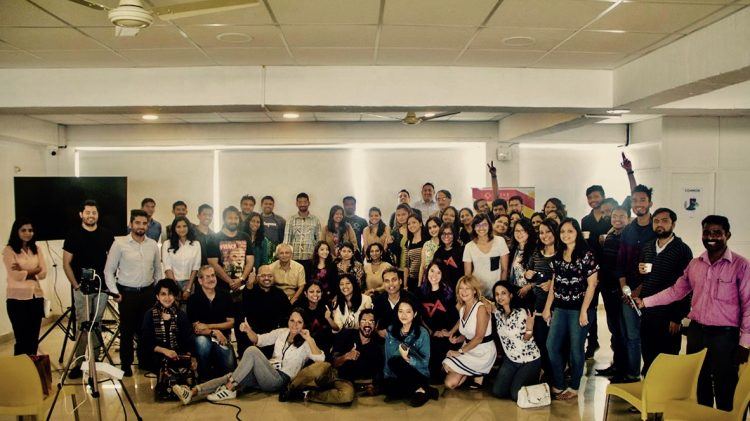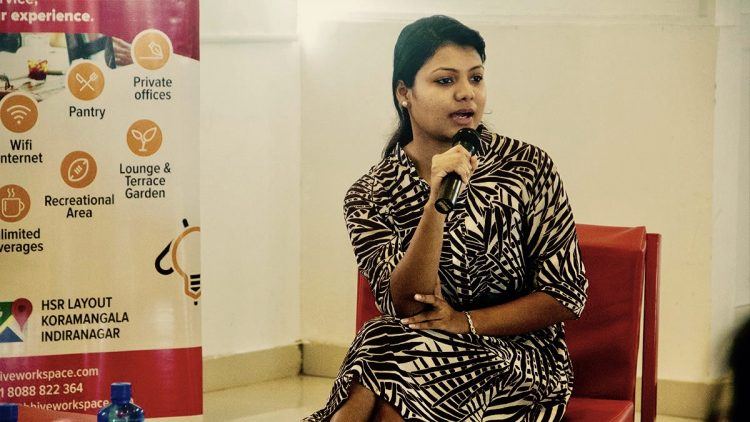
Team BHive and TIA with the three panelists (seated centre) at SheTalks. Photo credit: BHive.
Women are good for workspaces because they are good at multitasking, because they are good at balancing home and office, because women are nurturers…er…STOP! (facepalm) Women also have degrees and years of experience in most cases too, you know!
Well, for a feisty group of women entrepreneurs present at SheTalks – organized in Bangalore by co-working space BHive and Tech in Asia – the discussion was bound to don a few shades of feminism.
“Should I talk?” “Should I oppose them?” “Am I on the right path?” “Will I make a fool of myself?”
Now, a little bit of self-doubt never hurt anybody. But if you are intimidated being a woman in a male bastion, Pankhuri Shrivastava of Grabhouse will tell you why you shouldn’t let doubt cripple you.
Women have to dispel concerns over working late with men, and that girls don’t understand tech
She, for one, doesn’t like to think of herself as a woman when she is at work. “Most of these barriers and concerns of being a woman in a man’s world are mental barriers. In the entrepreneurial world, there is no right or wrong. It’s an open ground to experiment and no one else knows any better than you…”
Wait, so does that mean women don’t come across any prejudices? Sure, they do.
“I was a 22-year-old female entrepreneur. People did take me for granted,” Pankhuri says, “But once I spoke about my work and my startup, they were all ears.” Pankhuri sold her startup to Quikr in November 2016.
Pankhuri is the chief marketing officer of Grabhouse, a startup that helped consumers find houses without brokers. She co-founded Grabhouse back in 2013, when she was barely 22 years old. She isn’t a bag full of wisdom as yet, but she sure has learned how to navigate through the boy’s club.
Confidence is imperative, she says. “Know your subject; study it well,” is her second tried-and-tested win.
Pankhuri must be on to something, considering Grabhouse managed to raise US$12.5 million from the likes of Sequoia Capital and Kalaari Capital, besides undisclosed seed investment from India Quotient and a few angel investors.

Grabhouse co-founder Pankhuri Srivastava (left) and co-founder of Vibha Women Caroline Fernandes (right) speaking at the SheTalks event. Photo credit: BHive.
Caroline Fernandes, the co-founder of a platform that helps women entrepreneurs to network and learn – Vibha Women – agrees, and adds a cautionary clause – “These are self-doubts and stories that we think the outside world is creating against us. We have to deal with all this internally before plunging into entrepreneurship.”
Caroline is also a leadership coach, so you would want to take some notes on what she has to say.
Playing the devil’s advocate, Caroline says women tend to sulk and meander around their failures longer because “they process emotions much quickly than men.”
“If something doesn’t go our way we feel this is the end, or that we have been wronged. Women tend to get lost in the emotions of rejection and downfall much more than men.” Oops! Felt like facing the mirror?
Pankhuri sure felt like it. A sure-footed entrepreneur today, Pankhuri has had her days of self-doubt. A room full of investors – all men – staring down at her, judging her performance, “I have bitten my lips on many questions I had,” she says.
But the reason behind her reluctance, she realized, was often lack of preparation. The best way to tackle that is to ask as many questions as possible from your support group. “It’s okay not to understand a thing at first attempt. Ask questions from your team leaders, make every effort to know every detail about your business,” Pankhuri says.
And yet, the men around us have continued to get promoted faster and be paid more. As per a study by PayScale Human Capital, men get paid at least 4 percent more on an average than women.
A man’s pay typically stops growing after the age of 46, earning about US$95,000 per year. A woman, on the other hand, has a narrower window. According to PayScale, the age limit for women stands at 39, with an income of about US$60,000 per year.
But you’d think that shouldn’t stand in the way of an entrepreneur, should it? Think again.
Traditionally, women have been known to put everything else on the backburner.
The statistics go as far as indicating that a disparity exists. Sahyujyah Shrinivas, co-founder of clothes rental platform LibeRent shrugs off the stats and rather goes for the cut – “As much as we would like to think there is no sexism, there is. Some wouldn’t address you directly; others would demand a male member to discuss business deals with.”
Sahyujyah likes to call herself a staunch feminist. “I had to work hard to dispel concerns over working late with men, and that girls don’t understand tech, and so on,” she says.

LibeRent co-founder Sahyujyah Shrinivas at SheTalks event. Photo credit: BHive.
While an intern who questioned Sahyujyah’s capability as an entrepreneur was easy to handle, the same cannot be said about investors. At one of the meetings with investors she was branded arrogant for speaking her mind, she recalls. Her company didn’t secure the funding.
To put things in perspective, only 8 percent of the 1,010 startups funded in India in 2016 were founded by women.
But let’s not jump the gun. The abysmally low statistics around funding for women entrepreneurs may just indicate the dearth of female entrepreneurs or icons. Think of successful innovators and only men such as Steve Jobs or Bill Gates come to mind.
Sahyujyah thinks so too. “It is not the VC’s fault if they are concerned about what will happen to your startup if you get married. Because traditionally, women have been known to put everything else on backburner,” she says.
A few eyes rolled around her, but Sahyujyah is not one to be patronized. A young entrepreneur who has grown by 10 years in her three years of startup journey, Sahyujyah doesn’t shy away from calling spade a spade. “As women entrepreneurs,” she continues, “we have to be thick-skinned and prioritize our startup above anything else.”
“Some of us have to be rebels,” Caroline feels.
“The problems we face are same for both male and female entrepreneurs. But as women we need to have stronger willpower to create and grab an opportunity. We cannot be worrying about feeding the husband while my company needs me!”
And that’s why, Pankhuri says, it is important to know your limitations. “It is okay to ask for help from your support group. Don’t try to do everything on your own!” she says. Basically, the idea that the panelists wanted to drive home was this – the concept of a superwoman is a myth, just ask Indra Nooyi.
Remember what we said about self-constructed fears? Let’s get that in perspective here again.
“No one really goes out of their way to torture you to take on everything on your own. It’s all in our mind. Trying to do everything at the same time cannot be a way to make your presence felt,” Pankhuri says.
So master the art of delegation instead.

TIA’s queen bee at BHive for SheTalks. Photo credit: BHive.
It is easier said than done, we know. The challenges of gender were a bit too much for a feisty girl like Sahyujyah also. It followed her out of the conference room, into her workspace. She decided to bring in a male partner after several years of pitching alone to investors. Partly, it was to appeal to a kind of audience that would rate a founder’s credibility based on gender.
But the move has been productive for LibeRent. “Having a male founder worked for us. His perspective was important to look at strategies from a larger point of view,” Sahyujyah says.
Caroline seems to agree with Sahyujyah’s practical approach. “I have stopped worrying if people will treat me differently in business because of my gender. I have stopped comparing myself to others, including men,” she says.
She wants you to pick and choose your battles.
The bottom line, she says, is that if you’re successful, no one cares whether you’re a man or a woman. We take that as the final word!
This post The real deal about women pitching in a man’s world appeared first on Tech in Asia.
from Tech in Asia https://www.techinasia.com/pitch-like-a-girl
via IFTTT
No comments:
Post a Comment